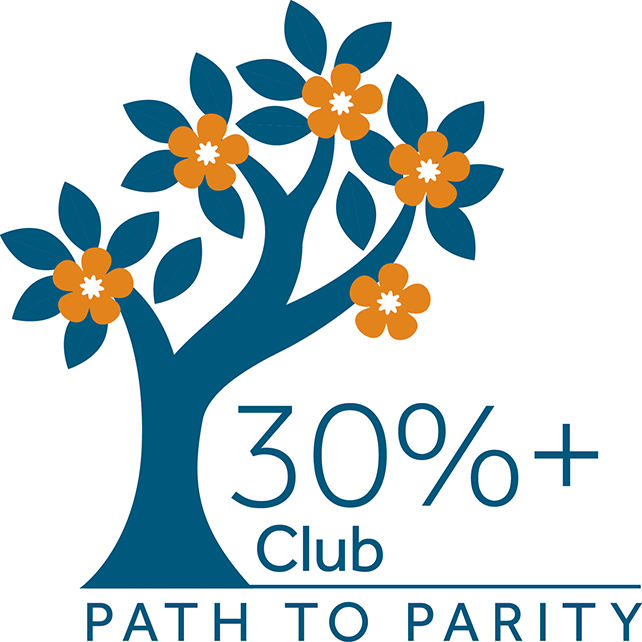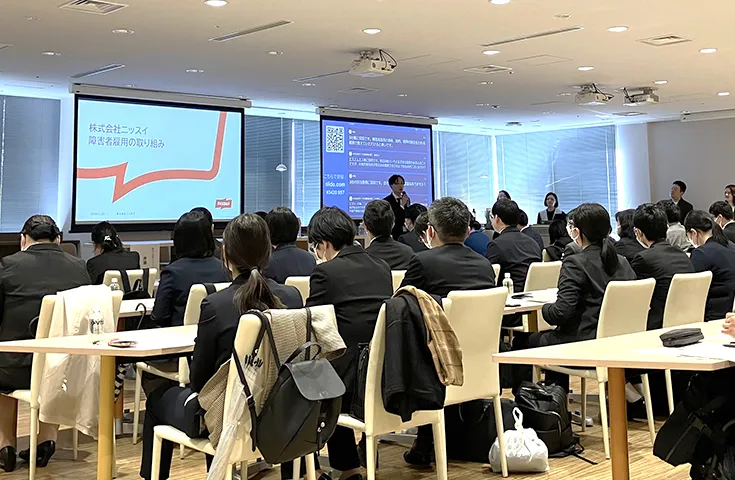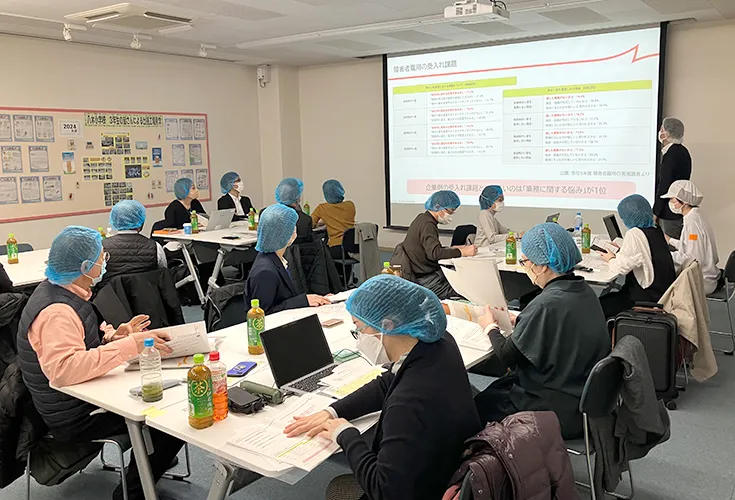The Nissui Group aims to achieve a state where, by 2030, it is generating innovation that leads to value creation by leveraging diverse human capital and providing opportunities for such human capital to demonstrate their fullest potential. Based on the belief that proactively incorporating diversity stimulates organizational vitality and leads to business development, we are advancing the development of human capital that actively tackles global and local social issues through our business activities. Furthermore, through these initiatives, we aim to be a company where diverse human capital can mutually develop and play active roles.
Centered on the Diversity Subcommittee, we are addressing the themes of “Promoting Women’s Advancement” and “Employment of Persons with Disabilities.” Furthermore, beginning in FY2024, we have recognized “LGBTQ+” as one of the elements that make up diversity and have begun discussions on this theme.
![[Figure] Diversity Subcommittee](/assets/img/site/148/148_356_img-01e.svg)
The targets and results specified in the long-term vision, “GOOD FOODS 2030,” and in the Medium-Term Management Plan, “GOOD FOODS Recipe1”and “GOOD FOODS Recipe2” are as follows. We seek to foster a robust organizational culture in which diverse human capital can explore the unknown by promoting Diversity & Inclusion.
| Indicators | Scope | Results | KPI | ||||
|---|---|---|---|---|---|---|---|
| FY2022 | FY2023 | FY2024 | Target by 2024 Medium-Term Management Plan "GOOD FOODS Recipe1" |
Target by 2027 Medium-Term Management Plan "GOOD FOODS Recipe2" |
Target by 2030 Long-Term Vision "GOOD FOODS 2030" |
||
| Ratio of female manager | Nissui Corporation |
6.8% | 6.6% | 7.9% | 10% | 15% | 20% |
To realize “what the Nissui Group would like to be in 2030,” we are conducting workplace meetings to discuss measures at each workplace. These meetings aim to create workplace environments where employees can take leave with peace of mind, not only for childcare but also for nursing care and illness. We are also working to establish workplace systems for leave periods and cultivate an organizational culture where each individual views leave-related matters as their personal concern.
Additionally, we are fostering inclusivity by offering opportunities to develop the mindset and skills needed to engage with diverse people, such as hosting Universal Manner Certification courses.
![[Photo] Universal Manner Certification 1](/assets/img/site/148/148_357_img-01.webp)
![[Photo] Universal Manner Certification 2](/assets/img/site/148/148_357_img-02.webp)
Nissui aims to foster an organizational culture where female employees can play active roles regardless of life events. To this end, we provide career development support to help realize their aspirations and support for balancing work and childcare, enabling continued growth even after experiencing life events such as childbirth.
In April 2025, Nissui formulated and announced the Fourth Phase Action Plan (plan period: April 1, 2025 to March 31, 2028) to develop an employment environment in which female employees can play an active part.
| Management items | Target | FY2022 | FY2023 | FY2024 | |
|---|---|---|---|---|---|
| Ratio of female among new hires | 50% | 34% | 36% | 41% | |
| University graduates or higher | ‐ | 41% | 57% | 49% | |
| Ratio of female managers | 10% or more | 7% | 7% | 7% | |
| Ratio of women in executive officer and general manager | 10% or more | 3% | 3% | 4% | |
On January 18, 2021, Nissui joined the 30% Club Japan in support of the objective of its activities.
The 30% Club Japan believes that a healthy gender balance in a company's decision-making body will not only enhance corporate governance but also facilitate sustained growth, boost international competitiveness, and in turn, help build a sustainable Japanese society. Based on this belief, its goal is to increase the percentage of female directors at the TOPIX top 100 companies, which was 12.9% as of the end of July 2020, to 30% by 2030.
TOPIX Presidents' Association, which is a community of the 30% Club Japan, has started holding discussions on essential issues that hinder women from playing an active role and is learning from actions that help resolve these issues. At Nissui, we are promoting activities for women's participation in management by setting numerical targets for the promotion of women to executive officers and general managers.

At Nissui, employees with disabilities work across approximately 30 diverse workplaces, including administrative departments, factories, and sales divisions. While the types of disabilities vary, we are committed to enabling each individual to leverage their unique characteristics and strengths through collaborative efforts between departmental personnel and HR staff, providing multifaceted support, including reasonable accommodations (Note), to create a work environment where everyone can work confidently and thrive.
Employing people with disabilities at Nissui is guided by the principles of “growth and active participation,” rather than being seen as merely a social contribution. We place great importance on the process of “utilizing input from employees with disabilities.”
(Note) Provision of reasonable accommodation: Refers to the act of providing necessary accommodations with reasonable effort when a person with a disability (not limited to disability certificate holders) expresses a need for some form of assistance to remove barriers that present themselves in society. This is mandated as an obligation for employers under the Act for Eliminating Discrimination against Persons with Disabilities.

Scope: Nissui Corporation
In FY2023, employees with disabilities participated in discussions within the Diversity Subcommittee to define the “Vision for the Employment of Persons with Disabilities” and “indicators toward achieving this vision.”
Our Mission: Starting with the employment of persons with disabilities, we aim to contribute to the creation of an organization in which every employee can work comfortably and play an active role.
Our Aspiration: We seek to expand opportunities for growth and active participation, and to broaden the potential for diverse work styles.
Our Beliefs: We value the involvement of individuals in the decision-making process.
Nothing about us, without us: the mindset of the Convention on the Rights of Persons with Disabilities.

The “Business Trust Team,” established in 2016 and composed of employees with disabilities, was founded with the mission of creating time for value-generating activities across departments. The team collaborates with approximately 20 departments on diverse operations, making significant contributions to DE&I promotion. Aligned with the policy of “'growth and active participation,” the team prioritizes education and development, actively expanding the number of members who have progressed to working permanently stationed in departments.
Through thoughtful communication and the use of “Reasonable Accommodation Sheets,” we create opportunities for employees with disabilities to better understand and articulate their unique strengths and effectively communicate them to others. We regularly review accommodations to ensure they are tailored to both the individual and workplace.
Our in-house “Reasonable Accommodation Briefing Sessions” have been well-received. In these sessions, employees with disabilities present alongside their supervisors, sharing their work styles that leverage their unique characteristics and discussing the balance between self-management and accommodation needs. These sessions have provided valuable insights and learning opportunities through case studies.

Presentation Material for Briefing Session
Specialist staff are available to provide consultations on disability certificate acquisition for employees. We support a comfortable work environment by offering workplace adjustments and guidance on accessing local welfare services, ensuring employees can work with confidence.
To promote environmental adaptation and smooth work integration, orientation and onboarding training has been introduced for new hires. A comprehensive set of manuals is also available to support the process. Currently, this training is conducted within the Business Trust Team; however, it is gradually being expanded to all employment departments.
Additionally, initiatives such as “Inter-site Training”, which enables employees to apply learnings and insights gained from other departments to their own roles, are being implemented. These initiatives, along with sharing employment case studies within the company and organizing supervisor meetings to promote mutual understanding, have been steadily enhanced each year to help employees with disabilities grow and thrive.
In FY2024, a “Work Fulfillment and Satisfaction Survey” was conducted for employees with disabilities and their supervisors/managers. The survey analyzed responses to questions such as, “Do you feel you can work with peace of mind both mentally and physically?” “Are there opportunities to take on challenges?” and “Is the environment conducive to seeking consultation?” The results have been used to inform initiatives that incorporate employee feedback.
This community fosters a workplace where every employee can fully demonstrate their potential by embracing and acknowledging each other's diversity, regardless of disability. Initiatives supporting Nissui’s DE&I efforts include “Lunchtime Online Discussion Sessions,” where employees with disabilities share their work experiences, and the standardization of operations to improve accessibility and ease of work for all employees. These initiatives contribute to advancing DE&I at Nissui.
Opportunities to take on challenges for advancement are available to all employees, regardless of disability.
While the speed of progress varies for each individual, the number of employees promoted to full-time regular employee status has increased yearly, and efforts to systematically establish career pathways are ongoing.
Supervisors and department managers play a key role in supporting the growth and success of employees with disabilities. The number of Employment Counselors for Persons with Disabilities and Supporters for Persons with Mental/Developmental Disabilities has been steadily increasing, enhancing the ability of managers to provide effective support. Through internal and external networks, including Group companies, platforms have been created for sharing examples, initiatives, concerns, and challenges. These platforms also serve as opportunities for mutual learning and collaboration to further improve support systems.

Nissui Group Factory Network Multi-Site Training Program
Specialist staff manage “Reasonable Accommodation Consultation Desks” and “Group Consultation Desks,” working as a team to address a wide range of employee consultations.
For inquiries about Nissui’s employment of persons with disabilities: jinji02@nissui.co.jp
Amid the growing demand for stable employment opportunities for the elderly, Nissui is re-employing employees who are willing to work at Nissui after retirement. Their responsibilities are reviewed at the time of rehiring and at contract renewal by taking into account the skills, aptitude and work experience, among others, and commensurate compensation is also arranged.
Nissui continues to provide an environment where senior citizens with experience and superior skills acquired over the years play an active part.
The Nissui Group’s production facilities employ people of many nationalities, and the number of languages that need to be supported is growing. Efforts have been made to provide multilingual support through the implementation of signage in various languages at these plants. The introduction of multilingual tools using visuals such as pictures and images for clear explanations is being actively pursued to improve the safety of foreign employees and their understanding of work procedures and rules.